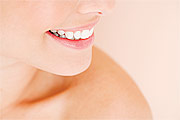 Is there no end to the benefits bestowed upon us by the multi-talented good fats?
Is there no end to the benefits bestowed upon us by the multi-talented good fats?
The old saying goes ‘an apple a day keeps the doctor/ dentist away – delete former/latter depending on your generation. But there seems to be something which can knock any fruit or vegetable into a cocked hat: yes, the humble polyunsaturated fatty acids (PUFAs).
A new piece of research has suggested that Omega 3 fatty acids found in foods such as oily fish, nuts and eggs will help people avoid gum disease and the more serious periodontitis.
The research examined the diet of 182 adults between 1999 and 2004, and found that those who consumed the highest amounts of fatty acids were a whole 30 per cent less likely to develop gum disease and 20 per cent less likely to develop periodontitis (severe gum disease).
Lead researcher of the study, Dr Asghar Z. Naqvi of Beth Israel Deaconess Medical Centre in Boston, said: “We found that n-3 fatty acid intake, particularly docosahexaenoic acid (DHA) and eicosapentaenoic acid (EPA) are inversely associated with periodontitis in the US population.”
As a result of this research, Dr Naqvi believes that dietary therapy could become a less expensive and safer way of preventing/treating periodontitis. Currently treatment involves mechanical cleaning and the application of antibiotics. Encouraging sufferers to eat more fish and nuts would also benefit their health in other ways.
Chief Executive of the British Dental Health Foundation, Dr Nigel Carter, said: “Most people suffer from gum disease at some point in their life. What people tend not to realise is that it can actually lead to tooth loss if left untreated… This study shows that a small and relatively easy change in people’s diet can massively improve the condition of their teeth and gums, which in turn can improve their overall wellbeing.”
The study was published in the November issue of the Journal of the American Dietetic Association.
Gum disease is caused by plaque (the film of bacteria that forms on the surface of the teeth). To prevent and treat gum disease all the plaque must be removed from the teeth every day by brushing twice a day for two minutes each time. This should be followed by cleaning in between teeth with interdental brushes or floss.
Inflammation and soreness of the gums is one of the first signs of gum disease, and often gums bleed when they are brushed during cleaning. You will notice your gums look puffy and inflamed where they meet your teeth.
Over time gum disease becomes more severe and can impact the tissues supporting the teeth. The bone anchoring the teeth in the jaw is lost and the teeth become loose, if not treated this can lead to teeth eventually falling out.
Anyone with inflamed and bleeding gums should visit their dentist to find out the appropriate way to treat it. If caught early, gum disease can be easily cured by short term use of medicated gels and mouthwash.
The British Dental Health Foundation is the UK’s leading oral health charity, with a 39-year track record of providing public information and influencing government policy. It maintains a free consumer advice service, an impartial and objective product accreditation scheme, publishes and distributes a wide range of literature for the profession and consumers, and runs National Smile Month each May, to promote greater awareness of the benefits of better oral health.
The Dental Helpline, which offers free impartial advice to consumers, can be contacted on 0845 063 1188 between 9am and 5pm, Monday to Friday. Alternatively, they can be contacted by email on helpline@dentalhealth.org.uk.
The Foundation’s website can be found at www.dentalhealth.org.uk
